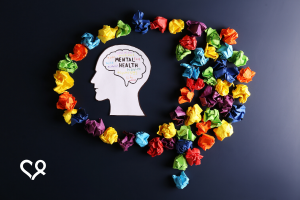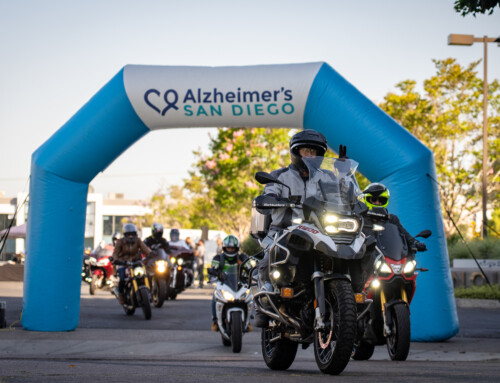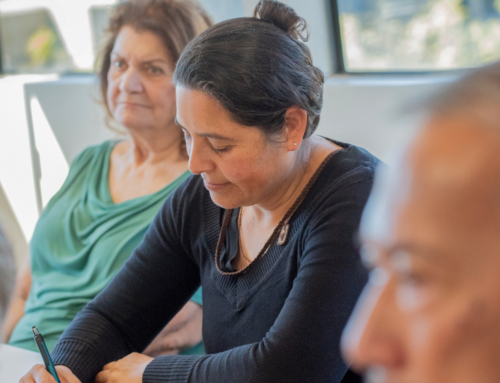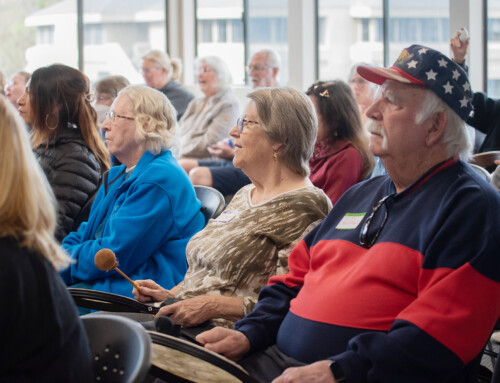Living in isolation can have an intense impact on our mental health – especially for dementia care partners. We know managing one’s own mental health and happiness is not an easy task by itself. And adding in the responsibility for another person during this time can create a lot of extra stress.
You are not alone in navigating this. To learn some helpful strategies, we checked in with Marcie Hanna, LCSW, a Clinical Advisor with Alzheimer’s San Diego. Marcie has more than 23 years of social work experience and received both her bachelor’s degree in Sociology and master’s degree in Social Work from San Diego State University.
She was first drawn to working with the older population because of her close relationship with her grandmother. As she’s developed these relationships at Alzheimer’s San Diego, she says: “I just love how older adults don’t have a filter and give incredible advice. It’s truly an honor to work with those who’ve learned so much in their life and I enjoy giving back to them.”
Keep reading as Marcie addresses some of the challenges dementia caregivers are facing during the COVID-19 pandemic – and shares how we all can preserve our mental health while social distancing.
Q: What are the biggest mental health issues these days?
A: The usual symptoms we find in care partners seem to still be present, but are heightened during this time. We are mostly seeing anxiety as an issue because of the demands of caring for someone at greater risk. The impact of coronavirus is sending all our anxiety off the charts. We are also seeing more symptoms of depression as the social isolation may make people more lonely and withdrawn. There may be less motivation to keep up with our relationships with others because we aren’t as socially active anymore.
According to clinical psychologist Dr. Brent Mausbach from UC San Diego Health, research has shown that 41 percent of caregivers experience significant symptoms of depression – compared to only 14.6 percent of the average population. He shared that compared to dementia caregivers with low stress who are not depressed, those who are experiencing high stress and are depressed have a 438 percent increased risk for cardiovascular problems. Dr. Mausbach also said that symptoms of depression and anxiety radically decrease after an individual is moved into memory care or passes away. However, he found that in addition to psychological stress, a high volume of caregivers develop signs of physical stress in the form of cardiovascular disease, for which research indicates symptoms do not necessarily decrease.
Coronavirus Updates in San Diego County | Learn what is happening locally
Q: What have clients voiced as their biggest concerns surrounding the pandemic?
A: One concern we’re hearing is the struggle of explaining COVID-19 to the person living with dementia. Their person wants to go out and do things, but it’s hard for them to understand all the complexities of the situation. What’s happening is they are having to repeat these answers over and over again. And because care partners also miss the outside world, it can be triggering and is the hardest thing to have to keep discussing it. Our team has been able to provide care partners with helpful language to use to try to get their person to understand, but we recognize how difficult this is.
Another concern is that in reality – from the outside looking in – things haven’t changed that much as care partners have always felt these emotions of feeling isolated and lonely. They have already been managing these things on a daily basis, so the presence of this disease just enhances these emotions. Plus, now there are the daily difficulties of figuring out how to maneuver through the world for basic tasks and allowed activities, having to now conduct more virtual than in-person visits and navigate technology.
Q: How has the separation from their person for those in a care facility affected their mental health?
A: It’s obvious the pain that care partners are experiencing. As social workers, one of our biggest concerns with the pandemic was this very change for those who aren’t able to schedule those in-person visits. For many, there are huge elements of grief as their person’s health may be declining, and they are starting to consider things like hospice. We have seen facilities trying to get more creative, with visits through the iPad or allowing them to wave from the window. But it is definitely a confusing time for people with dementia.
RELATED | 9 cognitively stimulating activities you can do at home
Q: Do you have any self-care tips/suggestions or other fun ideas for stress relief?
A: Of course typical elements such as maintaining a healthy diet, engaging in physical activity, aiming for quality sleep, and finding any spiritual practices that feed the soul such as meditation or prayer are still needed. But with COVID-19, we do have additional recommendations.
- Be aware of your news consumption. Do keep informed of what’s happening to relieve any stress or anxiety but make sure it’s coming from a reliable source like the CDC. Don’t stay glued to news 24 hours a day as this will just worsen stress.
- Try to live in the land of what is instead of what if. Focus on the things you can control versus things you can’t.
- Lighten up on yourself. You can’t expect yourself to adjust right away. Give yourself a break. Things will get forgotten, episodes of anger and sadness will happen and you should let it happen. You aren’t doing a bad job of caregiving. This time is hard for everyone.
- For planner types, think through and prepare for the worst case scenario. Don’t dwell, but do what you need to in order to reduce anxiety. Try not to stay fixated on what if this happens but take actions you can to get a plan in place for home care, medications, extra gloves, etc.
- Get rest during the day if you can. But when this isn’t realistic, make sure you’re taking some mini-breaks throughout the day. Small snippets of time like 5-10 minutes to watch something funny, call a friend, read one chapter in a book, do a guided meditation, focus on relaxing your body, or getting a snack or drink of water can make all the difference. If you have to take some extra time in the bathroom just to get a necessary breather, do so. For me, humor is the best way to lighten the mood. And remember to always focus on the positives as much as possible.
At the end of the day, remember you’re not alone. There are people out there going through the same exact thing, which is why it’s so important to connect with our virtual services like support groups or ALZ Companion visits.
RELATED | Learn more about our virtual services
The support groups can help you remember you’re not alienated and give you a social community during this time of isolation. We have also received wonderful feedback from those who have participated in ALZ Companion visits. Not only does it engage the person with dementia, but it’s a good way for the caregiver to get socially involved as well. It allows the person with dementia the freedom to talk about whatever they want and establish these bonds with others.
Finally, I always want to make sure care partners understand how good of a job they’re actually doing. It’s not only the healthcare workers that are the heroes – they are also heroes.
Need support? Get expert advice from one of our Clinical Care Coaches like Marcie by calling Alzheimer’s San Diego at 858.492.4400. We’re here to help!






